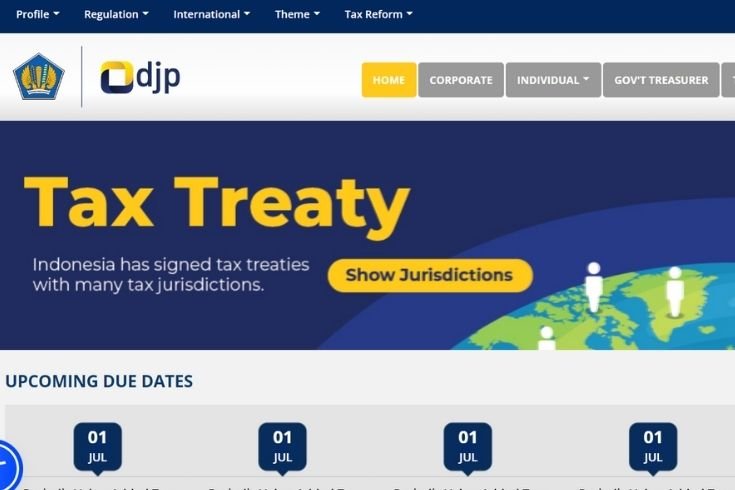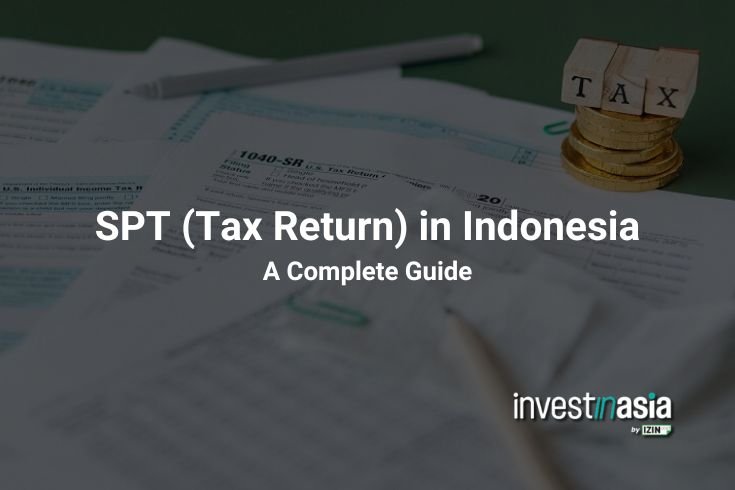Tax is one of the country’s most crucial revenue sources. To ensure citizens fulfill their tax obligations, the government requires them to submit a Tax Return (SPT). So, what is an SPT Tax Return and how does it work?
Also read; Indonesia Tax Rate: An Updated Guide
What is a Tax Return (SPT)?
A Tax Return or SPT is an official document used by taxpayers to report their income, expenses, and tax obligations to the tax authorities. This is a critical step in maintaining order and compliance with tax regulations.
The SPT plays an important role in the tax system. It not only reflects the taxpayer’s obligations but also helps the government collect the necessary funds for various development projects. By reporting on time, taxpayers contribute to the country’s economic progress.
Also read: Indonesia-Singapore Tax Treaty: Updated Guide
Types of SPT


According to regulations, there are two types of Tax Returns (SPT) known:
Periodic SPT
Periodic SPT is used to report taxes for a specific period, particularly every month. The types of taxes reported monthly through Periodic SPT include:
- Income Tax (PPh) Article 21.
- PPh Article 22.
- PPh Article 23.
- PPh Article 25.
- PPh Article 26.
- PPh Article 4 paragraph 2.
- PPh Article 15.
- Value Added Tax (PPN) and Luxury Goods Sales Tax (PPnBM).
- PPN Collector.
Although the nine types of taxes above use Periodic SPT, each tax form has a different format. These differences are related to the tax rates and objects for each tax type.
Not only do the forms differ, but also the reporting deadlines for each type of Periodic SPT. Taxpayers must report Periodic SPT for PPh no later than the 20th of the following month. Meanwhile, Periodic SPT for PPn must be reported at the end of the next month.
What if the Periodic SPT reporting deadline falls on a holiday? In this case, taxpayers must report their SPT on the next working day, for example, on the 21st or 22nd, according to the tax office’s working schedule (KPP).
Read also: Business Registration Number vs Tax ID: The Key Differences
Annual SPT
As the name suggests, Annual SPT must be submitted every year, or at the end of the tax year. Annual SPT itself is divided into two categories: Individual Annual SPT and Corporate Annual SPT.
Individual Annual SPT is further divided into three types of forms: Annual SPT Form 1770, SPT 1770 S, and SPT 1770 SS. The differences between these forms are based on the individual’s employment status, additional income sources, and annual taxable income.
Form 1770 is used by taxpayers with employment status who have additional income sources, while workers with annual income of less than or equal to Rp60,000,000 can use form 1770 SS. Workers with annual income over Rp60,000,000 are required to report their Annual SPT using form 1770 S.
The reporting deadlines for Annual SPT are also divided into two: three months after the tax period for individuals, and four months after the tax period for businesses. Generally, the reporting deadline for Individual Annual SPT is March 30, while for businesses it is a month later, on April 30.
Types of SPT Forms
SPT Form 1770 for Individual Taxpayers
SPT Form 1770 is used to report an individual taxpayer’s income. It includes salary details, other income, and potential tax credits that can be received by the taxpayer.
SPT Form 1771 for Businesses
Businesses use SPT Form 1771 to report their revenue, profit, and tax obligations. This helps the government understand the company’s contribution to state revenue.
Why Must Taxpayers Report SPT?


Purpose of SPT Reporting
SPT reporting is not just about paying taxes. It also serves to provide financial transparency and ensure that each taxpayer pays according to their ability.
Consequences of Not Reporting SPT
SPT reporting is mandatory. There are penalties, even criminal charges, awaiting those who do not report their annual SPT. What are the fines imposed on taxpayers who do not report their annual SPT?
According to the General Provisions and Tax Procedures Law, those considered to have this obligation are those who have a Taxpayer Identification Number (NPWP) and are still registered as taxpayers (WP).
Taxpayers who are late or do not report their Annual SPT will be fined according to Article 7 of the law. For individual taxpayers, the fine is Rp 100,000. For corporate taxpayers, the fine is larger, Rp 1 million.
Additionally, criminal penalties can also be imposed on taxpayers who intentionally do not report taxes. These penalties can include imprisonment and fines, as stipulated in Article 39 paragraph 1 of the KUP Law.
These criminal penalties include imprisonment for a minimum of 6 months and a maximum of 6 years. In addition, taxpayers will also be fined at least 2 times the amount of tax owed that is not or underpaid, and a maximum of 4 times the amount of tax owed that is not or underpaid.
Benefits of Tax Compliance
Reporting Annual SPT brings several benefits:
- Taxpayer obligations are fulfilled, avoiding administrative penalties.
- Taxpayers are exempt from criminal penalties as stipulated in Article 39 of the KUP Law.
- Through this reporting, citizens fulfill their responsibility in nation-building.
Preparation Before Filing Annual Tax Return
What preparations and requirements must be met when filing an Annual Tax Return?
The first step before filing an annual tax return is to ensure you have an Electronic Filing Identification Number (EFIN). EFIN, or Electronic Filing Identification Number, is an official identification issued by the Directorate General of Taxes (DGT) for taxpayers to register online and access e-Filing services. Whether you want to file an Individual or Corporate Annual Tax Return, taxpayers must have an EFIN. For those who do not yet have one, the EFIN application process can be done through an app.
Filing Annual Tax Return for Individual Taxpayers
The required documents are divided into several groups, including:
Very Simple Group (Form 1770SS)
Individual taxpayers, such as private employees, can use the 1721 A1 withholding slip and tax deduction evidence for overpayment tax returns.
Taxpayers who are civil servants must prepare the 1721 A2 withholding slip and tax deduction evidence for overpayment tax returns.
If the tax return status is nil or underpayment, there is no requirement to attach PDF documents.
Simple Group (Form 1770S)
Private employees need the 1721 A1 withholding slip for annual tax filing and tax deduction evidence for overpayment tax returns.
Civil servants require the 1721 A2 withholding slip and tax deduction evidence for overpayment tax returns.
Taxpayers with Separate Assets (PH) or Electing Separate (MT) status must attach an income tax calculation sheet and tax deduction evidence for overpayment tax returns.
If the tax return status is nil or underpayment, there is no requirement to attach PDF documents.
Form 1770
Taxpayers engaged in business/free work, receiving income from employers, or earning income subject to Final Income Tax need documents such as other income evidence, A1/A2 withholding slip, financial statements or balance sheet, gross revenue report or monthly gross revenue and expense recapitulation, and gross revenue calculation list.
Taxpayers with PH or MT status also need to attach an income tax calculation sheet.
Filing Annual Tax Return for Corporate Taxpayers
If you do not yet have a Corporate EFIN, here is how to apply for and activate a Corporate EFIN. Before filling out the Annual Corporate Income Tax Return (Form 1771), prepare the following documents to facilitate data entry:
- Previous year’s Annual Corporate Income Tax Return (Form 1771) and its attachments.
- VAT Periodic Tax Returns, including input and output tax invoices.
- Withholding Tax Returns for Article 21 and withholding evidence for Article 23 Withholding Tax.
- Withholding evidence for Article 4 (2) Withholding Tax and Payment Receipts for Article 25 Withholding Tax or Payment Receipts for Article 25 Tax Collection Letters.
- Financial statements (Profit and Loss, Balance Sheet), including audited financial statements from a public accountant.
- Articles of incorporation and any amendments.
- Attachments of the previous year’s Annual Corporate Income Tax Return, such as Depreciation List, Loss Compensation Calculation, and other cost lists.
- Matching of business turnover and non-operating income.
- Matching of purchases, operating expenses, and balance sheet components.
- Matching of beginning inventory with ending inventory in the Annual Corporate Income Tax Return (Form 1771).
Also read: How to File Annual Corporate Tax Returns in Indonesia
Procedure for Reporting SPT


Manual Reporting
Manual reporting can be done by filling out the SPT form obtained from the tax office. Once filled out, the form and supporting documents can be submitted directly to the nearest tax office.
Online Reporting
With the development of technology, taxpayers can now report their Annual SPT online through the DJP Online application. This application makes it easier to fill out forms and submit them without having to visit the tax office.
Via E-Filing
To report Annual SPT through e-Filing, taxpayers must first register and create an account on DJP Online. Here are the steps for reporting SPT via e-Filing:
- Log in to the DJP Online application.
- Select the “Report” menu.
- Click “e-Filing” and choose the appropriate SPT form.
- Fill out the form with complete and correct information.
- Upload the supporting documents.
- Submit the form.
Tips for Hassle-free Tax Return Reporting
Tax return reporting in Indonesia can be time-consuming. To make it easier, you can rely on InvestinAsia’s Indonesia Accounting and Tax Services. Our experienced accountants and tax consultants will help you report your tax return and other things like:
- Indonesia Tax Compliance Services
- Indonesia Payroll Services
- Indonesia LKPM Reporting Services
- Indonesia VAT Taxpayers Registration Services
Contact us now for FREE consultation and special package!
Understanding and complying with tax obligations is crucial for every citizen. By following the correct procedures and ensuring timely reporting, taxpayers contribute to the nation’s development and avoid potential legal issues. For more detailed information, it is advisable to consult the tax authorities or a tax professional.
Article reviewed by:
Tax Consultant of InvestinAsia



